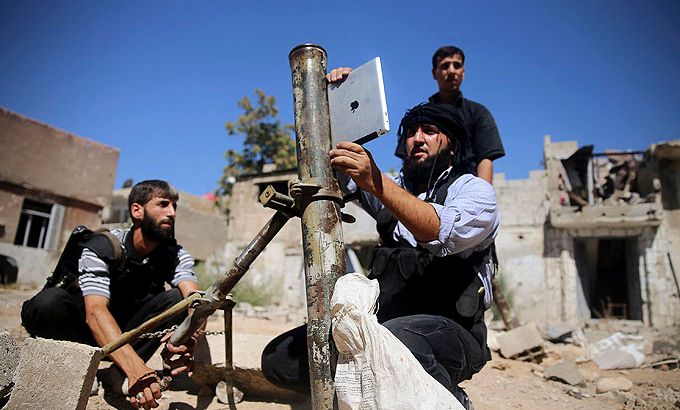Damascus calls arms deal ‘victory for Syria’
Syrian minister says abolishing chemical arms will help country emerge from crisis, in first reaction to US-Russia deal.

A US-Russian plan to remove Syria’s chemical weapons is a “victory” that averts war, a Syrian minister said, as Washington warned that the threat of US force “remains real”.
“On one hand, it helps the Syrians emerge from the crisis and on the other it has allowed for averting war against Syria…,” Ali Haidar, minister of state for National Reconciliation, told Russian news agency Ria Novosti on Sunday.
“It’s a victory for Syria that was achieved thanks to our Russian friends.”
Damascus said it will commit to the plan to eradicate its chemical weapons once it has United Nations approval, Omran al-Zoubi, Syria’s information minister, told ITN on Sunday, adding that the regime had already begun preparing relevant documents.
“Syria is committing itself to whatever comes from the UN,” al-Zoubi said. “We accept the Russian plan to get rid of our chemical weapons. In fact we’ve started preparing our list.”
His remarks came after US Secretary of State John Kerry met Israeli Prime Minister Benjamin Netanyahu to brief him on the plan to eradicate the chemical weapons.
Kerry came out of the talks with a word of warning for Damascus.
“The threat of force remains, the threat is real,” he said at a joint news conference in Jerusalem with Netanyahu.
Washington is seeking to bolster international support for the agreement inked in Geneva on Saturday, which demands action from Damascus within days.
The plan to dismantle and destroy Syria’s chemical arms stockpile – believed to be one of the largest in the world – by mid-2014 was thrashed out over three days of talks in Geneva between Kerry and his Russian counterpart, Sergey Lavrov.
It gives Syrian President Bashar al-Assad a week to hand over details of his regime’s arsenal of the internationally banned arms in order to avert unspecified sanctions and the threat of US-led military strikes.
It also specifies there must be immediate access for arms control experts and that inspections of what the US says is about 45 sites linked to the Syrian chemical weapons programme must be completed by November.
A high-ranking official in Syria told AFP news agency that the chemical deal could put Damascus back on the road to peace if it is coupled with an accord to cut off the supply of weapons to foreign-backed rebels.
“In parallel with the question of chemical arms, the whole world must work together to halt the influx of arms and mercenaries to Syria,” he said.
International support
The deal won the backing of China, a veto-wielding permanent member of the Security Council, which like Russia has vetoed several UN resolutions on Syria.
“This agreement will enable tensions in Syria to be eased,” Foreign Minister Wang Yi told his visiting French counterpart Laurent Fabius who will meet Lavrov on Tuesday in Moscow.
It was also welcomed by German Foreign Minister Guido Westerwelle, who cautioned: “It is important, however, that it be put into practice.”
Arab League chief Nabil El-Araby called the deal “a step closer to a political solution” to the civil war in Syria that has cost more than 110,000 lives since March 2011.
Ahead of Kerry’s talks with the leader of Syria’s neighbour Israel, Netanyahu said he hoped the accord would see the complete destruction of the Damascus regime’s chemical weapons.
The Syrian rebels fighting to oust Assad have rejected the deal, warning it would not halt the conflict.
“Are we Syrians supposed to wait until mid-2014, to continue being killed every day and to accept [the deal] just because the chemical arms will be destroyed in 2014?” asked Free Syrian Army chief General Selim Idriss.
Experts said the deal would be difficult – if not impossible – to implement.
Olivier Lepick of the Foundation for Strategic Research in Paris said he thought it would be impossible for Syrian stockpiles to be destroyed by mid-2014.
The deadline “seems to be a complete fantasy,” he told AFP. “Given the civil war, I don’t think it can happen… In peacetime it would take years to dismantle Syria’s chemical arsenal.”
Speaking to Al Jazeera from Sweden, Tilman Bruck, director of the Stockholm International Peace Institute, said he believed the deal could work.
“There is a real chance that this will succeed. At the same time it will not achieve regime change, and that is of course what the West had contemplated. So from that point of view it is not a very ambitious goal but still a step in the right direction.”
Kerry was to fly on to Paris for Monday talks with Fabius, British Foreign Secretary William Hague, Saudi Foreign Minister Saud al-Faisal and their Turkish counterpart Ahmet Davutoglu.
Also on Monday, the United Nations is due to release its investigation of an August 21 attack near Damascus.
Washington says Assad’s forces unleashed sarin gas on eastern suburbs, killing about 1,400 people.
UN chief Ban Ki-moon has accused Assad of multiple crimes against humanity and said the UN inspectors’ report would provide “overwhelming” confirmation chemical weapons were used.